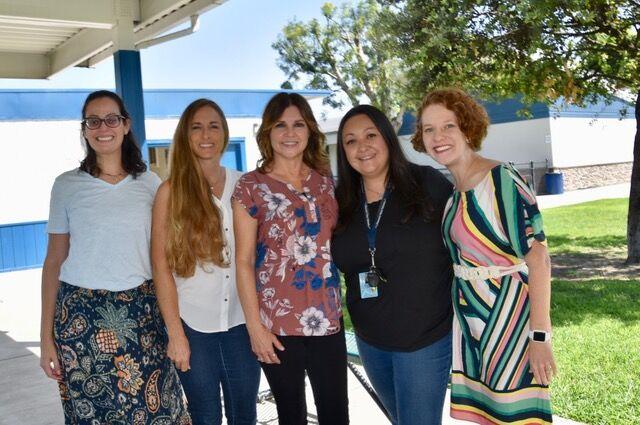
News
Brazilian teachers help Pleasant View teach life skills
BY JAMIE A. HUNT | jhunt@portervillerecorder.com | Reposted from The Porterville Recorder
POPLAR – Brazilian educators Tais Salomão and Fabiana Cury are working with Pleasant View superintendent Mark Odsather and principal Kim Parrish, as well as instructional coach Megan Hyder and Patricia Torres, community services and ELOP Director, developing a new way of teaching life skills at Pleasant View School.
At the school they’re teaching students life readiness lessons like the financial literacy project which can be done on a daily basis, or one hour a week at the minimum along with regular curriculum starting at pre-kindergarten through 8th grade.
With the financial literacy project students learn they’re accountable for their own actions, and learn how to organize their monetary goals. They work together in a small group in each class and have their own opinions about the lessons.
“Our vision is to start and help our kids get ready for life and self advocation,” said Odsather. “We are working across continents and across hemispheres, and we found these educators at the Da Vinci school system in El Segundo.”
He said they started talking to everyone in Poplar and Pleasant View about this way of teaching. And at Pleasant View all the teachers work together.
“We did a lot of video calls and Tais Salomão and Fabiana Cury came in April for two weeks and spent time in the classrooms showing and teaching the financial literacy project and the educators and students had many experiences together.”
It’s a one of a kind system, Odsather said, and it’s part of the United Nations Sustainable Developmental and Educational Goals (UN SDG) for 2030.
He said it’s time for a change in the existing educational system and “we need to prepare kids for life, embedding life preparedness skills or life readiness skills.”
On a daily basis, students in third grade during the FLP lesson learn how to spend (fake money) wisely, and they learn how to budget, and learn how to go to the bank (the teacher). They’re learning rapidly, and because they have to keep track of all their expenditures, they’re learning responsibility.
In every FLP lesson in each grade level students learn age appropriate lessons about one or two of these goals: reducing hunger, quality education, decent work and economic growth, industry-innovation and infrastructure, reduced inequalities, sustainable cities and communities, responsible consumption and production, and partnerships for the goals.
The FLP lessons are complimentary to the curriculum and “we learn and grow” said Odsather, and “prepare kids for life.”
“We want to encourage students with knowledge so they can use small actions and teach people around them, their family and neighbors,” said Cury.
“And all the projects are connected to the community with community members and guests,” said Salomao.
The Center for Powerful Public Schools came and surveyed Pleasant View parents to find out what their priorities were for their children. The survey showed the most important thing for parents was their children’s health and safety. Parents want their children to be loved and encouraged and taken care of. Academics came last according to the survey.
So starting in Poplar at Pleasant View there’s a transformational shift in educational practices at the school and they’re already seeing results. Students are interested in school, and they’re interested and enthusiastic about learning about the financial literacy project and how it impacts their lives, school administrators stated.
“The transformative educational practices have already generated a lot of interest in Brazil and have generated a lot of interest on a national level,” said Odsather, and “we hope to be a north star for others in changing their educational practices in the school system.”
Some of the older students at Pleasant View who are learning financial literacy skills are learning planning, and are even saving for a trip to Brazil.
For example, pre-kindergarten students are learning where money is used, and how it’s used in a miniature city in their classroom.
Kindergartners go on a treasure hunt, and they learn the value of coins, and learn to identify what’s valuable.
In first grade students learn how to make a garden on campus and have to learn how to figure out where plants grow properly. Then they need to figure out how much it costs at the grocery store, and if it’s less expensive to grow vegetables at school or at home, and they share their skills with their family.
With each FLP project there’s a final result and each child can demonstrate what they learned.
Second grade students make their own board games from scratch that will be focused on financial literacy, similar to Monopoly, Life, and other games. And at the end of the project they will host a game night for their families and the community, and everyone can play.
Third graders will have a Travel Agent project. And they will travel around the world. They will learn about currencies, other countries, cities, museums and activities. How to budget and make a travel journal.
“To give an idea of the Pleasant View arc of learning experiences we would like to invite educators and families to come and see what we are doing here at the school,” said Cury.
“What we have here is more than just common core standards. We have life ready skills and community involvement resulting in a real social impact on the students’ lives.”
“We are focusing on the whole child, not just their education,” said Torres.
Pleasant View is passionate about the work they’re doing and they always welcome visitors to come and experience for themselves what a school can be, said Salomao and Torres.

